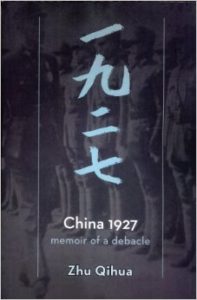A book that seems to have worked well for me in my teaching is Zhu Qihua China : China 1927: Memoir of a Debacle
The class was History of Modern China,, syllabus here
I was hoping that the book would draw students into “Revolutionary China” i.e. the China that was going to be transformed by an act of violence (physical, political or social) into a New China. The book itself is a memoir of Zhu’s participation in the Northern Expedition of 1926-27. He was a Left Guomindang/CCP type who worked as a propaganda officer with the troops of the western line of march i.e. headed to Wuhan.
It is a lively enough book, with some shooting and excitement, although does drag a bit in places, and lacks the either the clear plot of a fictional narrative or the “wartime absurdity” of a more literary memoir. Although Zhu is in some respects the The Good Soldier Švejk, he is not really aware of it. Instead, he is a dedicated revolutionary who is happy to commit his life to saving China. He does a lot of name-dropping (He meets Mao, Zhou Enlai, and lots of other important people) but the point of assigning the book is not to give a narrative of the Northern Expedition.
The main use of the book is to portray a revolutionary cadre and the contradictions of the revolution. Zhu is propaganda official who gives speeches, organizes groups and publishes things. He also engages in office politics and criticizes all of his rival units who are just going through the motions and trying to profit from the revolution. He could be Chairman Mao criticizing the bureaucratization of the party sometimes.
Although he (and the students) may sometimes doubt how much good his propaganda is doing, he does take a broad view of what he is work, and what the revolution is. He both drawn to the peasant Red Spear rebels and contemptuous of their political backwardness. (The masses are such a disappointment sometimes.) He talks a lot about his admiration for female comrades who were willing to abandon everything for the revolution, and he is aware of how much more they are risking than he is. He also spends a lot of time speculating about their sleeping arrangements and trying to romance them. He never seems clear on the difference between a revolutionary cadre and a traveling member of the traditional literati. We visit a lot of scenic spots and eat a lot of good food in this book. He is part of a revolutionary army that sometimes behaves like a warlord army, and he is aware of this.
I think the students enjoyed it, but more importantly, I got a good set of papers out of it. This was in part because they are good group of students, but also because the book gives you so many ways to get into interesting topics. It is the most readable introduction to the contradictions and of being a revolutionary that I know of.
